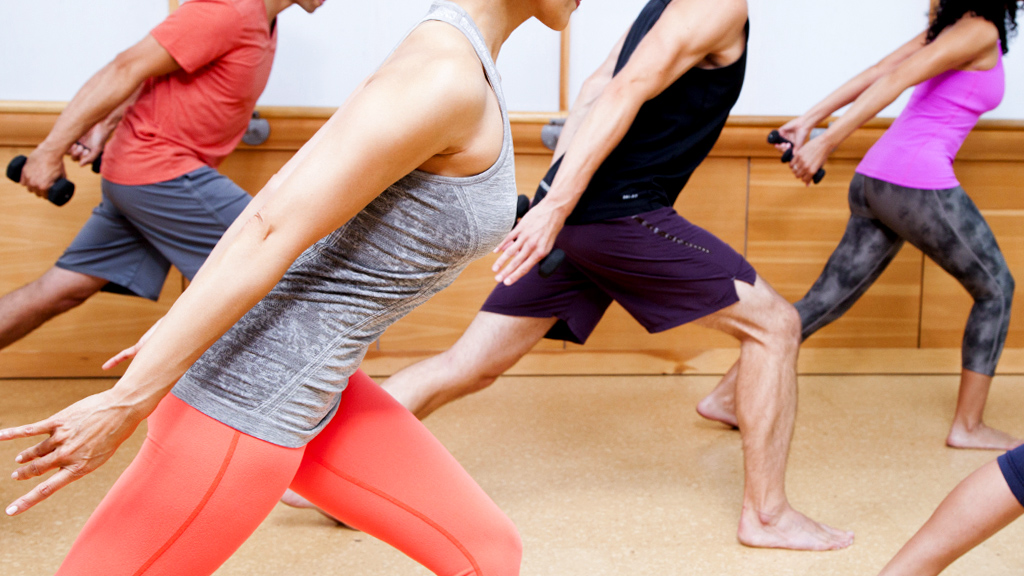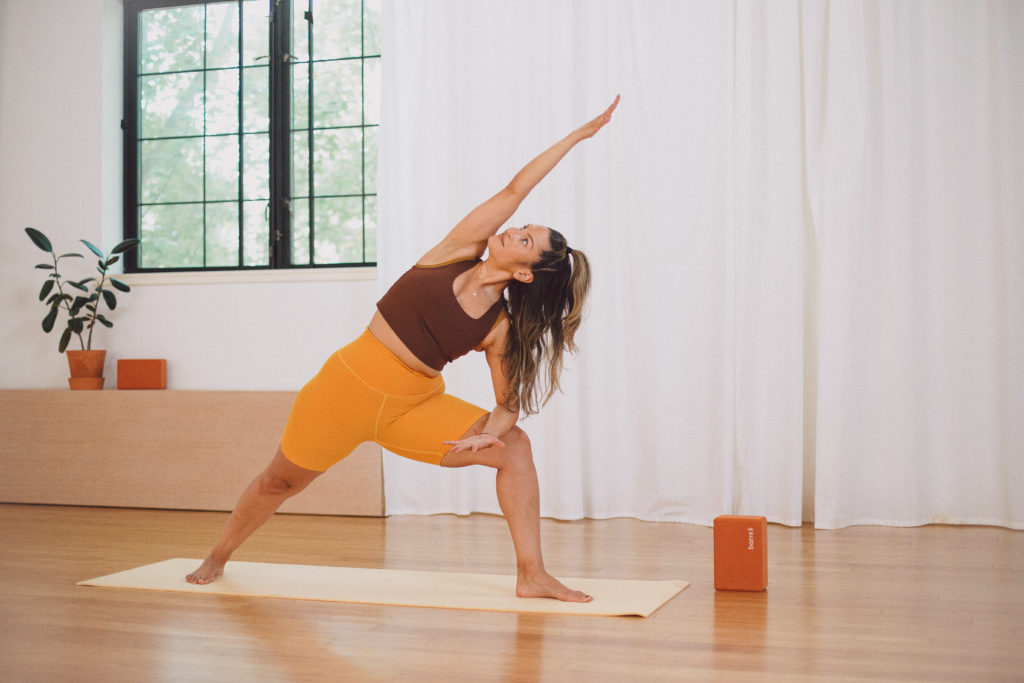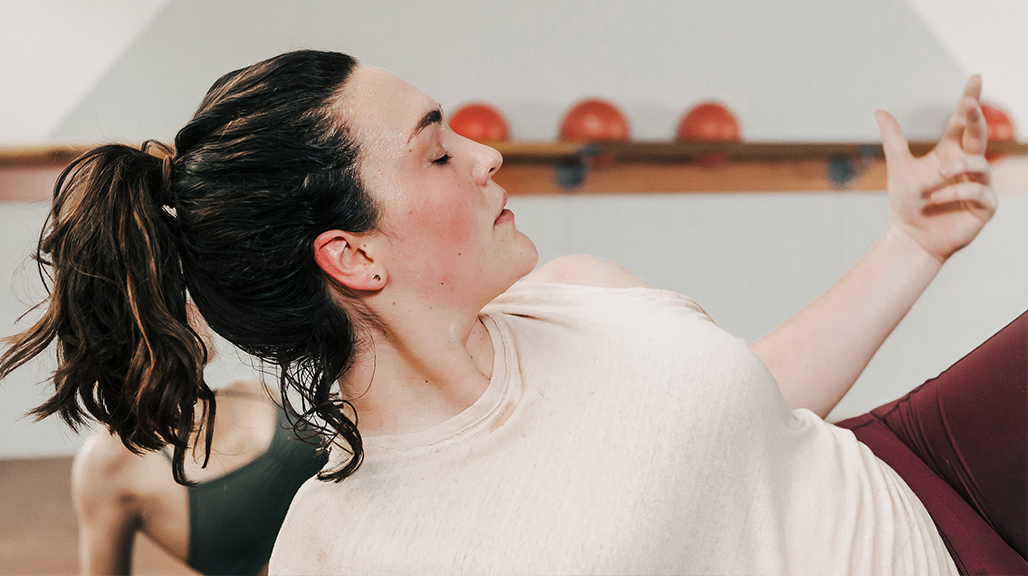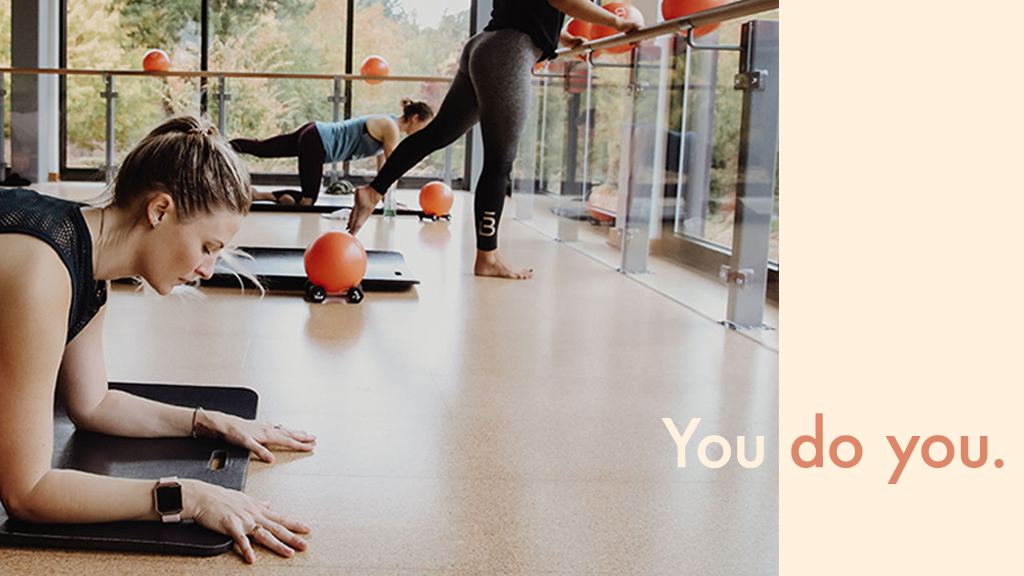Connect
Beyond the Barre: Honor Your Truth
As barre3 Director of Training, Lisa Schale-Drake is used to taking charge and having people rely on her. But when she got pregnant with twins, she found herself in the unfamiliar position of needing to rely on others. Read on to find out how Lisa learned to honor her truth, and why it’s the best thing that ever happened to her.

When I got pregnant, I expected the storybook version of mommyhood. I’d have a cute belly, I’d work out right up until the day I went into labor, I’d give birth to an adorable baby, and I’d bounce back to my pre-pregnancy body within six weeks. After all, that’s the narrative we’re fed by the media—why should mine be any different?
Then I found out I was having twins, and the storybook slammed shut. I gained 20 pounds in the first trimester—only a fraction of which was actual baby weight. By the second trimester I was measuring as big as women normally do in their third trimester. By the third trimester, I tested positive for pre-eclampsia and had to go on bed rest, banishing all hope of exercising up until my due date.
Not having control over my body was a foreign feeling to me—and a huge blow. But as tough as the pregnancy was, post-pregnancy was where I was truly tested—both physically and mentally.
After giving birth to my twins, I assumed I was fit enough to jump right back into my workouts. Even though I’d cautioned countless new moms against going all-in too soon, I ignored my own advice and went full throttle. I realized my mistake when I tried to do plank on the floor during my first class post-pregnancy. Ouch. Like many new moms, I had abdominal separation, so a floor plank was not in the cards for me. I moved up to the bar and did a standing plank, and that’s when I found the connection I needed.
As humbling as it was, I reassessed my approach to class. Instead of going turbo, I dialed back and worked on the basics. When the instructor offered layers, I didn’t add them. Amazingly—and ironically—my body started coming back much more quickly when I didn’t push myself too hard. By going simpler, I got stronger.
But my struggle went beyond just physical limitations. I had bought into the image of a supermom—the amazing woman who loves being a mother, always looks put-together when she leaves the house, works full-time, and makes it all look completely effortless—but I couldn’t have felt farther from this. My babies were colicky, and I was beyond sleep-deprived. Just leaving the house was an enormous feat—to say nothing of leaving the house looking put together. I remember going to work meetings and trying to hold it together but feeling like I would break down in tears at any second. I couldn’t do it all, and that made me feel guilty and angry with myself. I felt robbed of the narrative I had been promised, and I was miserable.
Finally, my husband sat down with me and told me that the way I was living wasn’t sustainable. That was my wake-up call. He rarely pushes, so I knew that if he felt like he had to say this, something was wrong. I wasn’t serving anyone—least of all myself—and something had to change.
Just like when I tried to do plank on the floor and realized it was too much too soon, I swallowed my pride and let go of expectations. I allowed my friends and family help me with the babies. I let my team at work support me in a way I never had before. I gave up on trying to live up to the media ideal of a mom and accepted my own version instead. In other words, I embraced one of the of the most important tenets of barre3: I honored my truth.
That shift made all the difference for me. Instead of beating myself up for not being able to do it all, I began to appreciate what I can do. I can take 15 minutes every night to walk the dog alone. I can do a barre3 class for 60 minutes and focus on just me. If I only get 10 minutes a day of quality time with my kids and the rest of our time together is utter chaos, that’s OK. It’s ironic: We strive for perfection because we think it will make us happy, but it was only when I let go of it that I began to find joy again.
Through this entire journey, barre3 was my saving grace. When I was pregnant, it was the one workout I could modify as I got bigger. When I couldn’t work out, I relied on the barre3 nutrition philosophy so I could at least eat healthily. After having my babies, the strong barre3 community buoyed me—both at work and in the studio.
Now that I’m past my transition, I feel so grateful to be able to give back to the community that has given so much to me. And thanks to my journey, I’m able to do that with an extra dose of empathy. I’ve been the turbo woman who could go full throttle, and I’ve been the new mom who can’t feel her core. Being able to relate to both ends of the spectrum means that I can do what barre3 did for me: help them find their truth and honor it.
As barre3 Director of Training, Lisa Schale-Drake is used to taking charge and having people rely on her. But when she got pregnant with twins, she found herself in the unfamiliar position of needing to rely on others. Read on to find out how Lisa learned to honor her truth, and why it’s the best thing that ever happened to her.

When I got pregnant, I expected the storybook version of mommyhood. I’d have a cute belly, I’d work out right up until the day I went into labor, I’d give birth to an adorable baby, and I’d bounce back to my pre-pregnancy body within six weeks. After all, that’s the narrative we’re fed by the media—why should mine be any different?
Then I found out I was having twins, and the storybook slammed shut. I gained 20 pounds in the first trimester—only a fraction of which was actual baby weight. By the second trimester I was measuring as big as women normally do in their third trimester. By the third trimester, I tested positive for pre-eclampsia and had to go on bed rest, banishing all hope of exercising up until my due date.
Not having control over my body was a foreign feeling to me—and a huge blow. But as tough as the pregnancy was, post-pregnancy was where I was truly tested—both physically and mentally.
After giving birth to my twins, I assumed I was fit enough to jump right back into my workouts. Even though I’d cautioned countless new moms against going all-in too soon, I ignored my own advice and went full throttle. I realized my mistake when I tried to do plank on the floor during my first class post-pregnancy. Ouch. Like many new moms, I had abdominal separation, so a floor plank was not in the cards for me. I moved up to the bar and did a standing plank, and that’s when I found the connection I needed.
As humbling as it was, I reassessed my approach to class. Instead of going turbo, I dialed back and worked on the basics. When the instructor offered layers, I didn’t add them. Amazingly—and ironically—my body started coming back much more quickly when I didn’t push myself too hard. By going simpler, I got stronger.
But my struggle went beyond just physical limitations. I had bought into the image of a supermom—the amazing woman who loves being a mother, always looks put-together when she leaves the house, works full-time, and makes it all look completely effortless—but I couldn’t have felt farther from this. My babies were colicky, and I was beyond sleep-deprived. Just leaving the house was an enormous feat—to say nothing of leaving the house looking put together. I remember going to work meetings and trying to hold it together but feeling like I would break down in tears at any second. I couldn’t do it all, and that made me feel guilty and angry with myself. I felt robbed of the narrative I had been promised, and I was miserable.
Finally, my husband sat down with me and told me that the way I was living wasn’t sustainable. That was my wake-up call. He rarely pushes, so I knew that if he felt like he had to say this, something was wrong. I wasn’t serving anyone—least of all myself—and something had to change.
Just like when I tried to do plank on the floor and realized it was too much too soon, I swallowed my pride and let go of expectations. I allowed my friends and family help me with the babies. I let my team at work support me in a way I never had before. I gave up on trying to live up to the media ideal of a mom and accepted my own version instead. In other words, I embraced one of the of the most important tenets of barre3: I honored my truth.
That shift made all the difference for me. Instead of beating myself up for not being able to do it all, I began to appreciate what I can do. I can take 15 minutes every night to walk the dog alone. I can do a barre3 class for 60 minutes and focus on just me. If I only get 10 minutes a day of quality time with my kids and the rest of our time together is utter chaos, that’s OK. It’s ironic: We strive for perfection because we think it will make us happy, but it was only when I let go of it that I began to find joy again.
Through this entire journey, barre3 was my saving grace. When I was pregnant, it was the one workout I could modify as I got bigger. When I couldn’t work out, I relied on the barre3 nutrition philosophy so I could at least eat healthily. After having my babies, the strong barre3 community buoyed me—both at work and in the studio.
Now that I’m past my transition, I feel so grateful to be able to give back to the community that has given so much to me. And thanks to my journey, I’m able to do that with an extra dose of empathy. I’ve been the turbo woman who could go full throttle, and I’ve been the new mom who can’t feel her core. Being able to relate to both ends of the spectrum means that I can do what barre3 did for me: help them find their truth and honor it.
![]()










25 people have left a comment. Join the conversation!
View Comments